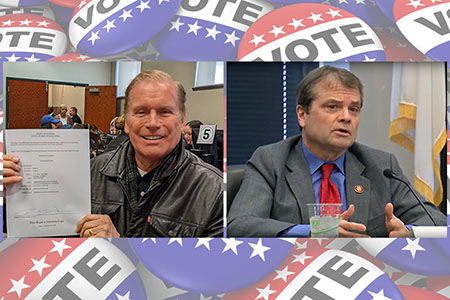
Cook County Assessor Fritz Kaegi is under fire as the Democratic Machine endorses Patrick Hynes to challenge him in the 2026 primary.
(Above) Cook County Assessor Fritz Kaegi (left in photo) and Lyons Township Assessor Patrick Hynes. Jul. 31, 2025 – Cook County Assessor Fritz Kaegi has a big problem. He is too honest for the traditionally corrupt job of assessing 1.9 million parcels of real estate in the county. The Democratic Machine wants to kick out Kaegi and have endorsed Lyons Township Assessor Patrick Hynes to run in the 2026 Democratic Primary, according to Axios Chicago and other political sources. Hynes, 53, is a nephew of former Assessor Thomas C. Hynes, who ruled the office for nearly two decades from 1978 to 1997. A Beverly native, politically connected Patrick Hynes had a long career at the Cook County Assessor’s office. He has served as Lyons Township Assessor since 2021. The west suburban township has a population of 112,732.
Favorable valuations allegedly were handed out to wealthy downtown property owners who kept donations flowing into Berrios’ campaign coffers. Nepotism and patronage ran rampant, and ethics rules were ignored by Berrios. In 2010, the Better Government Association wrote that the county assessor’s office had traditionally been “one of the plum political jobs – a bastion for patronage and big campaign donations.” In 2018, Kaegi ran on a pledge to overhaul Berrios’ dysfunctional office, and voters believed him. A scathing investigative report by the Chicago Tribune and ProPublica about Berrios led to Kaegi being elected. On the whole, Kaegi has delivered his promise of reform. Kaegi inherited not only a deeply flawed, ethically bankrupt office, but also a dusty, decades-old data system that relied on reams of paper. When Kaegi first took office, his staff allegedly found 600 tons of paper tax appeals in storage. However, Kaegi’s two terms have been rocky. Critics say he is responsible for recent massive residential tax hikes. Kaegi also butted heads with the Cook County Board of Review, which is more firmly entrenched with the Democratic Machine. Critics also blame Kaegi for delays in issuing the second installment of real estate tax bills – including the one due August 1, 2025. The Assessor’s job is hugely important – overseeing the nation’s largest property tax system with 1.9 million Cook County real estate parcels to be valued. Over decades, the Assessor’s office was headed by a diverse collection of mostly Irish-American Democratic-Machine creatures – including P.J. (Parky) Cullerton, Thomas M. Tully, Thomas C. Hynes, and James Houlihan. These political leaders always attended the St. Patrick’s Day parade and seemed to be connected to the legendary Mayor Richard J. Daley’s friendly Irish clan. The Democratic Machine hopes that Patrick Hynes will fill the historic shoes of the late Thomas C. Hynes. A physics teacher from the Beverly neighborhood on Chicago’s Far Southwest Side, Tom Hynes dressed like a Harvard professor and had a long and successful political career.
In 1979, Tom Hynes gave this reporter an award for “explaining the mysteries and complexities” of the Cook County assessment system for a series of Chicago Sun-Times articles I wrote as real estate editor. This writer liked Hynes for his intellect. His deputy assessor, Dick Vanecko, was a knowledgeable man who happened to be married to one of Mayor Richard J. Daley’s daughters. In 1987, Hynes ran against incumbent Chicago Mayor Harold Washington, the city’s first Black mayor. Later, Hynes withdrew to avoid splitting the White vote with two other candidates – Democrat Edward Vrdolyak and Republican Don Haider. Assessor Kaegi modernized the office Kaegi launched a plan to modernize the Assessor’s office data system, replaced most of Berrios’ top staffers, and halted the office’s practice of accepting contributions from tax appeal lawyers. Under Kaegi, homeowner assessments generally have taken a smaller share of the tax levy, while business properties were handed a larger share. No wonder Kaegi has been targeted and criticized by big commercial property owners and apartment developers. The International Association of Assessing Officers has presented Kaegi’s office with its “Outstanding Public Information and Outreach Award.” And the National Association of Counties gave his office an award for its digital innovation efforts. Assessor Kaegi is a highly qualified expert in property assessments, holding both the Chartered Financial Analyst and Certified Illinois Assessment Officer designations. Before serving as Assessor, Kaegi had a 13-year career as a financial asset manager at Columbia Wanger Asset Management (now Columbia Threadneedle Investments). Born and raised in Chicago’s Hyde Park neighborhood, Kaegi holds an MBA from Stanford University. The ancient Cook County Assessor’s office has existed in its present form since 1932. Let’s look back at the track records of some of the most interesting folks who once occupied the chair of Cook County Assessor: P.J. “Parky” Cullerton, 1958-1974. A descendant of a long line of politically connected Cullertons, Parky served as a Democratic Committeeman and Alderman of Chicago’s 38th Ward before Mayor Richard J. Daley appointed him to the Assessor’s job in 1958, a post he held until 1974.
Thomas M. Tully, 1974-1978. A former assistant state’s attorney, Tully’s website describes him as “one of Chicago’s most prominent and well-respected” lawyers. Handsome Tully had a nice smile and dressed like a Wall Street trader. According to a 2018 Chicago Tribune investigation, Tully’s firm, Thomas M. Tully & Associates – which specializes in property tax appeals – contributed $5,000 to Assessor Berrios in the fourth quarter of 2016. Tully’s law firm has filed appeals for clients on commercial and industrial properties with a value of about $2.9 billion since Berrios took office – winning assessment reductions of $756 million. James Houlihan, 1997-2010. Houlihan was a protege of Tom Hynes, serving as a deputy assessor. He was appointed Assessor after Hynes resigned from serving 18 years in the post. In 1972, Houlihan was elected as Illinois state representative and reelected in 1974.
Critics said Houlihan operated outside of professional appraisal standards. They said he skewed residential values so low that it severely uncalibrated the county’s property tax system. Ironically, Houlihan was a rival of Berrios, who then was serving as a member of the Cook County Board of Review, and later ascended to the Assessor’s post. |

















